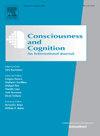Investigating the role of sensorimotor spatial dependencies in shaping conscious access to virtual 3D objects
IF 2
3区 心理学
Q2 PSYCHOLOGY, EXPERIMENTAL
引用次数: 0
Abstract
According to sensorimotor accounts of perceptual experience, the subjective sense that an object is real builds up as one learns how sensory inputs depend on bodily movements. Using virtual reality (VR), we manipulated the complexity of spatial dependencies governing interactions with unfamiliar 3D objects to assess whether they would show differential access to visual awareness during a continuous flash suppression paradigm (CFS). In specially-designed sensorimotor mastery tasks, participants had to manually control objects rotating in congruent, opposite, novel (orthogonal), or random directions in response to their actions. These tasks alternated with a continuous flash suppression task, in which participants first indicated stimulus detection as quickly as possible and subsequently identified its shape, evaluating the access of stationary objects to visual awareness. We hypothesised that objects governed by lawful (learnable) dependencies would overcome suppression faster than randomly moving objects (for which there is no world-related statistical structure to learn). While sensorimotor control performance decreased with condition difficulty, the pre-registered analysis yielded no differences in breakthrough times across conditions. We discuss methodological factors, stemming from the dual-task CFS design, which potentially account for these null findings and which warrant further study. Overall, our findings are consistent with prior evidence for the negligible role of spatial congruence (compared to contingency) between actions and their visual consequences in shaping perceptual experience under interocular suppression paradigms.
研究感觉运动空间依赖在塑造对虚拟3D物体的有意识访问中的作用。
根据感觉运动对知觉经验的描述,当一个人了解到感觉输入是如何依赖于身体运动时,就会建立起一个物体是真实的主观感觉。使用虚拟现实(VR),我们操纵控制与不熟悉的3D物体交互的空间依赖关系的复杂性,以评估它们是否会在连续闪光抑制范式(CFS)中表现出对视觉意识的差异访问。在特别设计的感觉运动掌握任务中,参与者必须手动控制物体以一致、相反、新颖(正交)或随机方向旋转,以响应他们的动作。这些任务与连续的闪光抑制任务交替进行,在该任务中,参与者首先尽可能快地指出刺激检测,随后识别其形状,评估静止物体对视觉意识的访问。我们假设受合法(可学习)依赖关系支配的对象会比随机移动的对象更快地克服抑制(因为没有与世界相关的统计结构需要学习)。虽然感觉运动控制性能随条件困难而下降,但预登记分析显示,不同条件下的突破时间没有差异。我们讨论了源于双任务CFS设计的方法学因素,这些因素可能解释了这些无效发现,并且值得进一步研究。总的来说,我们的研究结果与先前的证据一致,即在眼间抑制范式下,动作及其视觉结果之间的空间一致性(与偶然性相比)在塑造知觉经验方面的作用可以忽略不计。
本文章由计算机程序翻译,如有差异,请以英文原文为准。
求助全文
约1分钟内获得全文
求助全文
来源期刊

Consciousness and Cognition
PSYCHOLOGY, EXPERIMENTAL-
CiteScore
4.30
自引率
8.30%
发文量
123
期刊介绍:
Consciousness and Cognition: An International Journal provides a forum for a natural-science approach to the issues of consciousness, voluntary control, and self. The journal features empirical research (in the form of regular articles and short reports) and theoretical articles. Integrative theoretical and critical literature reviews, and tutorial reviews are also published. The journal aims to be both scientifically rigorous and open to novel contributions.
 求助内容:
求助内容: 应助结果提醒方式:
应助结果提醒方式:


